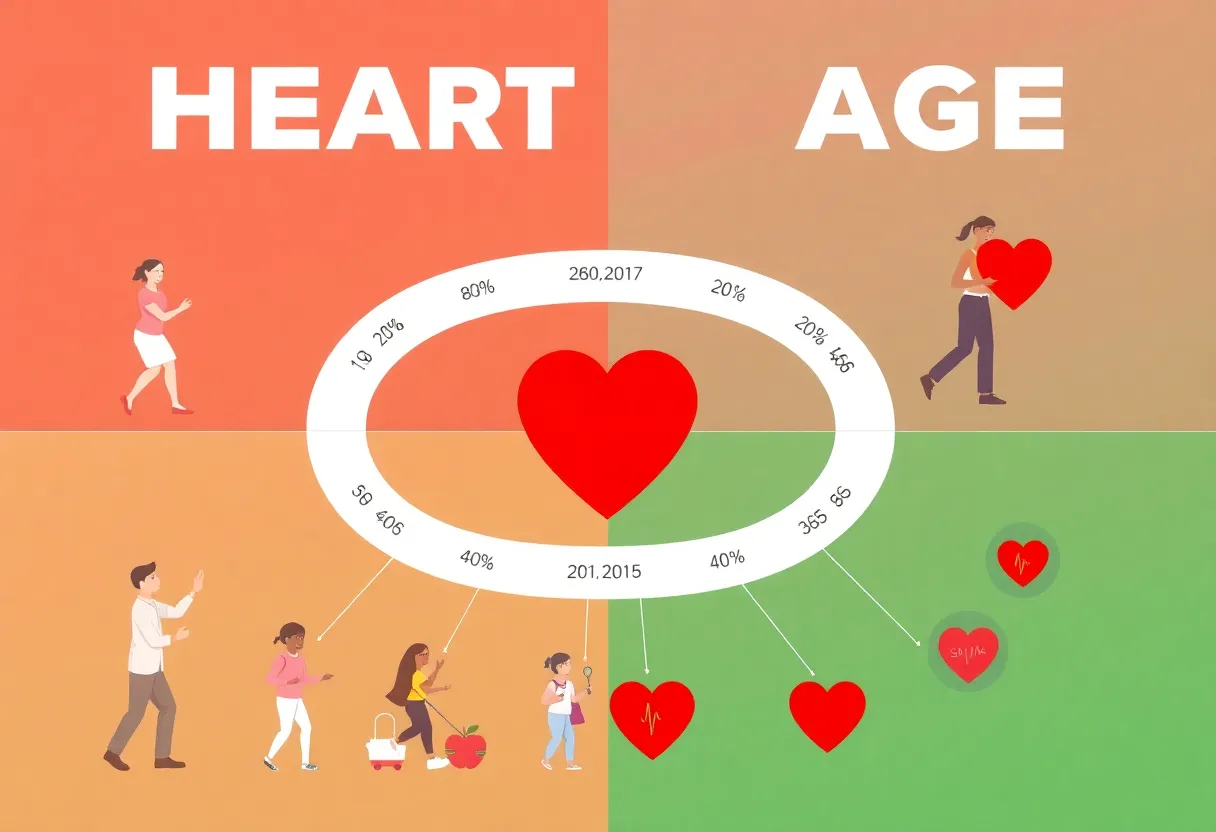News Summary
A new study by Northwestern Medicine reveals that many U.S. adults have a ‘heart age’ significantly older than their actual age, indicating a heightened risk of heart-related issues. The research involving over 14,000 adults highlights disparities based on demographics and socioeconomic factors. For instance, men and those with lower education levels tend to have a higher heart age. The study introduces an online calculator to help individuals assess their heart age, aiming to foster better communication of heart health risks and motivate healthier lifestyle choices.
Chicago, IL — New Study Reveals Many U.S. Adults Have a ‘Heart Age’ Several Years Older Than Their Actual Age
A recent study conducted by Northwestern Medicine highlights a concerning trend among U.S. adults: a significant portion of the population has a “heart age” that is considerably older than their chronological age. This disparity, often exceeding a decade, underscores the ongoing challenge of cardiovascular health across the country.
Key Findings of the Study
The research, involving over 14,000 U.S. adults aged 30 to 79, analyzed data from the National Health and Nutrition Examination Survey between 2011 and 2020. Participants without prior cardiovascular disease were evaluated for their cardiovascular risk factors to determine their “heart age.” On average, women have a heart age of 55.4 years compared to their actual age of 51.3 years, while men have a heart age averaging 56.7 years versus a chronological age of 49.7 years. These figures indicate that many individuals are at a higher risk of heart-related problems than their age suggests.
The Impact of Demographics and Socioeconomic Factors
The gap between actual age and heart age varies significantly across different groups. Men tend to have a wider disparity than women, and those with lower incomes or less education are more likely to have a higher heart age than their actual age. Notably, about one-third of men with a high school education or less had a heart age more than ten years older than their chronological age.
Racial and ethnic disparities also emerge prominently in the findings. Black men have an average heart age 8.5 years older than their actual age, with Black women at a 6.2-year gap. Hispanic men and women follow, with averages of 7.9 and 4.8 years, respectively. White men and women show smaller gaps—6.4 and 3.7 years—while Asian men and women have differences of 6.7 and 2.8 years, respectively. These disparities highlight the disproportionate risk faced by minority groups.
Tools and Communication of Heart Risk
The study introduces a free online calculator created by Northwestern scientists to assess an individual’s “heart age.” This tool considers common cardiovascular risk factors, including blood pressure, cholesterol levels, smoking habits, and diabetes status. The purpose is to help individuals better understand their risk in a straightforward way, as traditional measures often use percentages that some find difficult to interpret.
The calculator is designed to supplement, not replace, clinical evaluations. Healthcare professionals emphasize that it should be used as part of ongoing discussions about heart health, with medical advice tailored to each person’s specific needs.
Implications and Future Directions
Presenting cardiovascular risk as a “heart age” aims to foster clearer communication between doctors and patients, potentially motivating at-risk individuals to adopt healthier lifestyles or seek preventive care. The lead author of the study, Dr. Sadiya Khan, notes that this approach might encourage younger adults to recognize their risk early and act proactively.
Ongoing research will examine whether utilizing the “heart age” method improves health outcomes and increases awareness of preventive therapies. The study titled “PREVENT Risk Age Equations and Population Distribution in US Adults” aims to reshape how heart disease risk is communicated and understood across the country.
Context and Public Health Relevance
Despite advances in public health, heart disease remains the leading cause of death in the U.S. with many adults not receiving adequate preventive care. Highlighting the disparity in heart health across demographics underscores the importance of targeted awareness and intervention strategies.
Overall, this study emphasizes that understanding and communicating cardiovascular risk in an accessible way is a vital step toward reducing preventable heart disease and improving health outcomes nationwide.
Deeper Dive: News & Info About This Topic
HERE Resources
Drinking Habits Impact on Health and Disease Risks
Nationwide Debate on Food Choices for Medicaid and Medicare Recipients
President Trump Diagnosed with Chronic Venous Insufficiency
Push for National Mesothelioma Registry to Support Veterans
Woman Hospitalized After Severe Liver Toxicity from Turmeric Supplements
Additional Resources
- The Washington Post: Heart Biological Age and Cardiovascular Disease
- STAT: Most Americans’ Hearts Older than Chronological Age
- Medical Xpress: Adults’ Hearts Older than Actual Age
- Today: Heart Age Study and Calculator
- BuzzFeed: Heart Cardiovascular Age
- Wikipedia: Heart Disease
- Google Search: Cardiovascular Disease
- Google Scholar: Heart Age Calculator
- Encyclopedia Britannica: Heart
- Google News: Heart Disease
Author: STAFF HERE VIRGINIA BEACH WRITER
The VIRGINIA BEACH STAFF WRITER represents the seasoned team at HEREVirginiaBeach.com, your trusted source for actionable local news and information in Virginia Beach, Virginia Beach City, and beyond, delivering "news you can use" with comprehensive coverage of product reviews for personal and business needs, local business directories, politics, real estate trends, neighborhood insights, and state news impacting the region—supported by years of expert reporting and strong community input, including local press releases and business updates, while offering top reporting on high-profile events like the Virginia Beach Neptune Festival, East Coast Surfing Championship, and military homecoming celebrations, alongside key organizations such as the Virginia Aquarium, Virginia Beach Convention Center, and Oceana Naval Air Station, plus leading businesses in tourism and defense like Busch Gardens and Northrop Grumman, and as part of the broader HERE network including HEREWilliamsburg.com, providing credible, in-depth insights into Virginia's vibrant landscape. HERE Virginia Beach HERE Williamsburg





